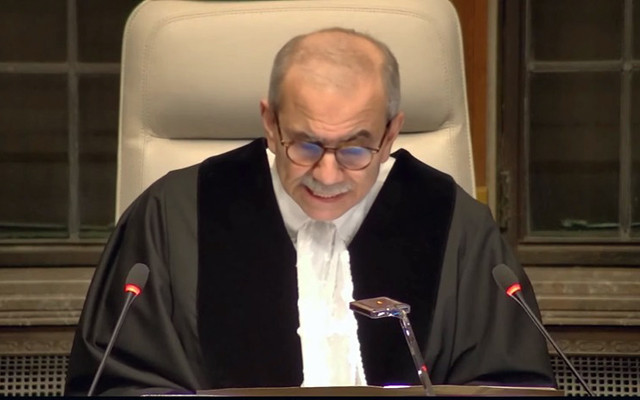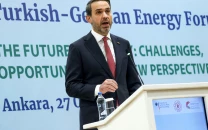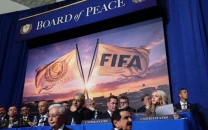ICJ deals massive blow to Israel as its isolation grows
UN’s top court orders ‘immediately’ halt to Rafah offensive

The top UN court ordered Israel Friday to halt military operations in Rafah, a landmark ruling likely to increase international pressure for a ceasefire more than seven months into the war sparked by Hamas's October 7 attack.
The International Court of Justice also demanded the immediate release of all hostages still held by Palestinian militants, hours after the Israeli military announced troops had recovered the bodies of three more of the captives from northern Gaza.
The Hague-based court, whose orders are legally binding but lack direct enforcement mechanisms, also ordered Israel to keep open the Rafah crossing between Egypt and Gaza, which it closed earlier this month at the start of its assault on the city.
The orders come ahead of separate meetings on the Gaza conflict in Paris later Friday between the CIA chief and Israeli representatives on one side and French President Emmanuel Macron and the foreign ministers of four key Arab states on the other.
In its keenly awaited ruling, the ICJ said Israel must "immediately halt its military offensive, and any other action in the Rafah governorate which may inflict on the Palestinian group in Gaza conditions of life that could bring about its physical destruction in whole or in part".
Israel must "maintain open the Rafah crossing for unhindered provision at scale of urgently needed basic services and humanitarian assistance", the UN court added.
"The court finds it deeply troubling that many of these hostages remain in captivity and reiterates its call for their immediate and unconditional release," it said.
Israel gave no indication it was preparing to change course in Rafah, insisting that the court had got it wrong.
"Israel has not and will not carry out military operations in the Rafah area that create living conditions that could cause the destruction of the Palestinian civilian population, in whole or in part," National Security Adviser Tzachi Hanegbi said in a joint statement with the foreign ministry spokesman.
"Israel will continue to enable the Rafah crossing to remain open for the entry of humanitarian assistance from the Egyptian side of the border, and will prevent terror groups from controlling the passage," the statement added.
There was no immediate comment from Prime Minister Benjamin Netanyahu, who was huddling with ministers.
Centrist war cabinet member Benny Gantz said Israel remained committed to fighting on "to return its hostages and ensure the security of its citizens at all times and everywhere, also in Rafah."
UN chief Antonio Guterres stressed that "decisions of the court are binding and trusts that the parties will duly comply with the order from the court," his spokesperson said.
The Palestinian ambassador to the United Nations called on Israel to abide by the court's ruling immediately.
Read World Court to rule on request to halt Israel's Rafah offensive
"We expect that resolutions of the ICJ be implemented without hesitation," Riyad Mansour told reporters.
Hamas gave the ruling a qualified welcome, regretting only that it applied solely to Rafah and not the whole Gaza Strip.
The Gaza war broke out after Hamas's October 7 attack resulted in the deaths of more than 1,170 people, mostly civilians, according to an AFP tally based on Israeli official figures.
Militants also took 252 hostages, 121 of whom remain in Gaza, including 37 the army says are dead.
Israel's retaliatory offensive has killed at least 35,800 people in Gaza, mostly women and children, according to the Hamas-run territory's health ministry.
The Israeli military said the three hostages whose bodies were recovered in north Gaza on Friday -- Israeli hostage Chanan Yablonka, Brazilian-Israeli Michel Nisenbaum and French-Mexican Orion Hernandez Radoux -- were "murdered" during the October 7 attack and their bodies taken to Gaza.
It follows the recovery last week of four bodies of hostages found in tunnels under Jabalia, including of Hernandez Radoux's girlfriend Shani Louk.
The military reported raids in Jabalia and operations in central Gaza, and said "troops eliminated dozens of terrorists" in the north.
A Palestinian security source told AFP there were clashes between Israeli forces and militants in the town of Jabalia and its refugee camp, with another source at Kamal Adwan hospital saying it was "out of service, and has 14 medical staff trapped inside".
Along with Al-Awda, Kamal Adwan is one the last two functioning hospitals in northern Gaza, both of which are besieged, according to the World Health Organization.
Israeli ground troops started moving into Rafah in early May, defying global opposition and sending more than 800,000 people fleeing, according to UN figures.
Troops took over the Palestinian side of the Rafah border crossing with Egypt, further slowing the sporadic arrival of trucks carrying badly needed aid for Gaza's 2.4 million people.
But on Friday Egyptian President Abdel Fattah al-Sisi agreed in a call with his US counterpart Joe Biden to allow UN aid through the crucial Kerem Shalom crossing to Gaza, the White House said.
Aid delivered through Kerem Shalom must first travel into Israel before being taken to Gaza.
Ceasefire talks involving US, Egyptian and Qatari mediators ended shortly after Israel launched the Rafah operation, though Netanyahu's office this week said the war cabinet had asked the Israeli delegation "to continue negotiations for the return of the hostages".
CIA chief Bill Burns was expected to meet Israeli representatives in Paris on Friday or Saturday in a bid to relaunch negotiations, a Western source close to the issue said.
Macron's office said the French president would be joined in the capital later by his own foreign minister and the top diplomats of Qatar, Egypt, Jordan and Saudi Arabia for talks on the conflict.
The US-based Axios news website said Israeli negotiators have developed a "new proposal" which includes "some compromises" in Israel's position compared to the last round of negotiations in Cairo.
Egypt's Al-Qahera News, which is linked to the intelligence services, reported late Thursday that "the Israeli position is still not sufficient to reach a deal". AFP
.



















COMMENTS
Comments are moderated and generally will be posted if they are on-topic and not abusive.
For more information, please see our Comments FAQ